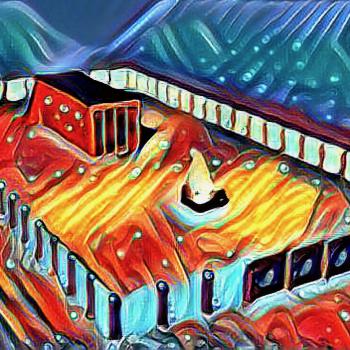This introduction will serve to set up the blogs for the next couple weeks. I’m going to be looking at a Scripture that a few of the Early Church Fathers chime-in on, something that doesn’t occur often. Different Fathers have expertise in various areas of Scripture, just like many leaders do today.
The passage we’ll be considering is the Rich Young Ruler (Matthew 19.16-30; Mark 10.17-31; Luke 18.18-29). We’ll look at it first through the lens of Clement of Alexandria, secondly Origen, and then Jerome.
Alexandria is in North Africa. There is a lot of Theology that develops out of North Africa over time. Clement of Alexandria and Origen are both leaders at the school there. Jerome is a leader in the Bethlehem area.
Clement’s views and writings set the stage for education, as it develops in the medieval times in Europe. He is quite a philosopher who becomes a Christian, and influences Christianity in general.
Alexandria is the place where Mark is martyred, according to tradition. He probably is an influence on that Christian community’s development. Alexandria is also known for a profound ancient library.
Let’s consider what Clement of Alexandria has to bring to the table about the Rich Young Ruler, as we consider the ancient virtue of Simplicity.
Clement’s stark conclusions
i. Clement’s stark conclusions about the Rich Young Ruler
Clement of Alexandria is considered to be “the first great Alexandria exegete.”[1] He refers to the story of the Rich Young Ruler and draws some stark conclusions. He points out something that is a common pitfall, when we look at this story.
Some who hear this saying [the Rich Young Ruler] will give up all hope of attaining eternal life, surrender themselves totally to the world, cling to the present life as if it were the only thing left to them, and so move farther away from the path to the life to come, no longer inquiring either whom the Lord Master calls rich, or how old that which is impossible to man becomes possible to God.[2]
So what is Clement saying? He’s pointing out a truth that he’s seen develop in a short time after the age of the Disciples.
ii. People are misreading this
People are misreading this story and misunderstanding what the Bible says about riches. They read it and believe that the Rich Young Ruler is doomed. However, we don’t know the story of the end of his life. We only know his decision in the moment. Clement says people read this passage the wrong way, then turn away and despair because they have wealth. They despair thinking, “If the rich young ruler couldn’t do it, then I can’t do it either.” Then they run into the world with open arms and turn away from the faith. So Clement passionately argues against this false view.
Clement states that this passage is discussing, not so much physical money, but our thoughts, and our desires, and and our passions about our money.[3]
iii. Riches aren’t evil, but our views of riches can be
He’s one of the first to argue that riches aren’t evil, but that our views of riches can very well be evil. That is the greater point of the story.
We all know that it’s not money that is the root of all evil. 1 Timothy 6.10: “For the love of money is a root of all kinds of evil. Some people, eager for money, have wandered from the faith and pierced themselves with many griefs” (NIV). Nowhere does the Bible say that money, in and of itself, is evil.
Personally, I’ve been around people who are rich and people who are not so rich. I have discovered, in all my years of ministry and growing up in church, that it’s not always the rich man who has a problem with money. It’s often the poor man. Sometimes, the people who don’t have any money are the ones who want it the most, and live for it day-in and day-out. For instance, sometimes it is those who don’t have any money who can’t afford to pay their tithe. May I say that you can’t afford not to pay your tithe in the Kingdom of God.
Some people hoard their money. They hold onto it white-knuckled, thinking they’re going to get ahead, but they always find themselves fighting for more. It’s all because they have a wrong view of money!
Money is not an end in itself. It’s merely a means. Furthermore, God is the one who’s the provider, but He’s not going to provide and bless if we are hoarding it and spending it on the wrong things.
iv. The point is to test our allegiances
Clement points out very vividly that the point of the story is to test our allegiances. The question is not what was the eternal condition of the Rich Young Ruler. That’s not the point of the story. The point of the story is, what’s the eternal condition of your soul? Money is one of those things that can sway it, if you allow it.
Is it God or is it money?
Who do we hold our allegiance to?
Clement goes on to say this, in sheer poetry.
If one is able in the midst of wealth to turn from its mystique, to entertain moderate desires, to exercise self-control, to seek God alone, and to breathe God and walk with God, such a man submits to the commandments, being free, unsubdued, free of disease, unwounded by wealth.[4]
The Bible and the Early Church bears out that we can walk the line with God, that wealth does not have to rule us, but that we through Christ can rule over our wealth.













